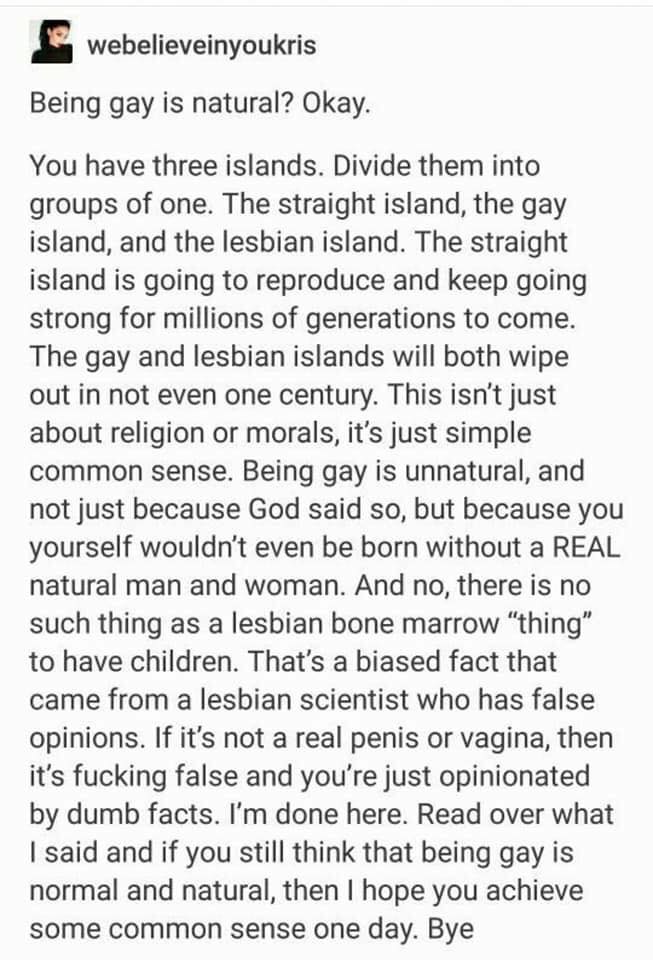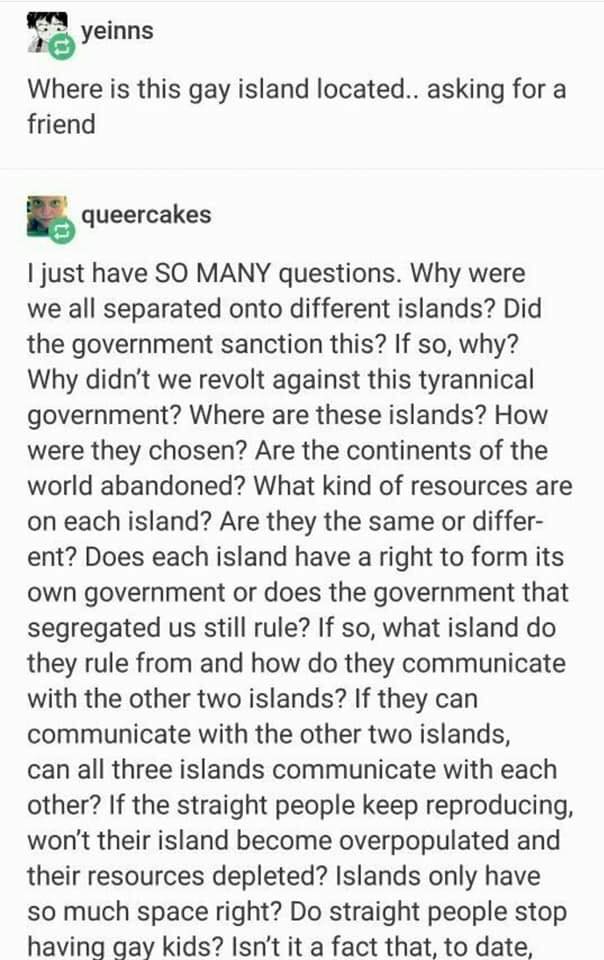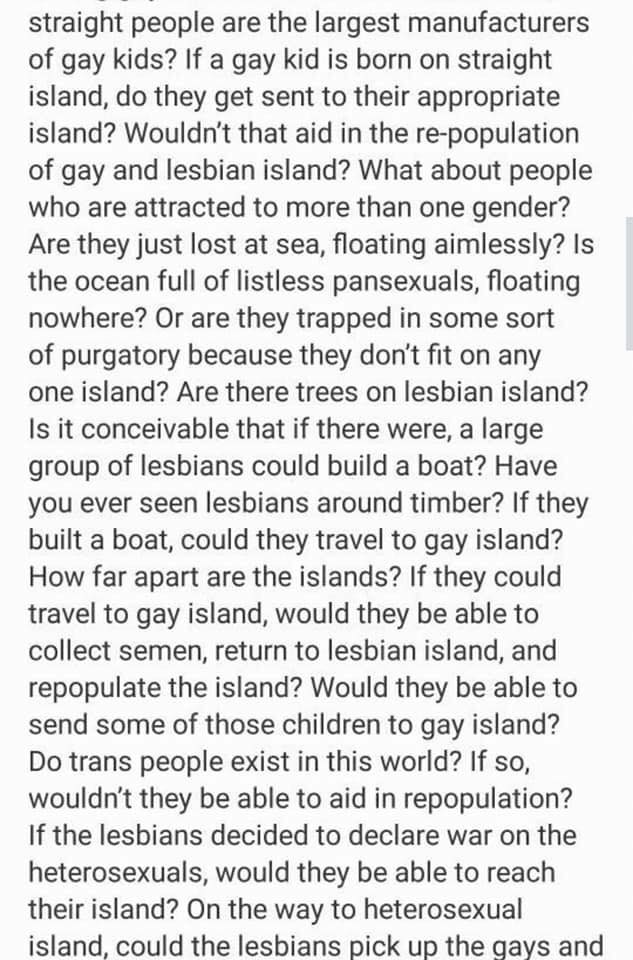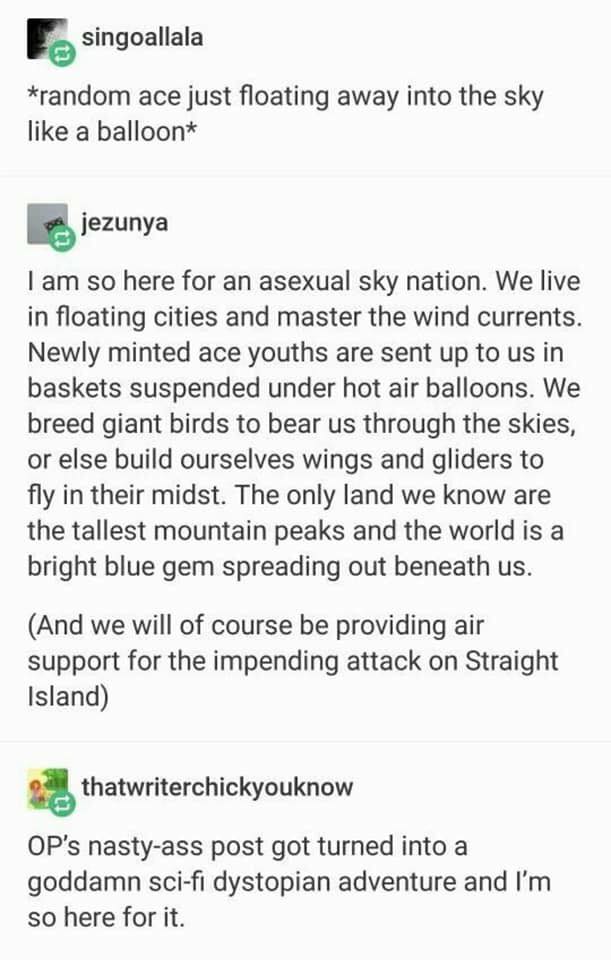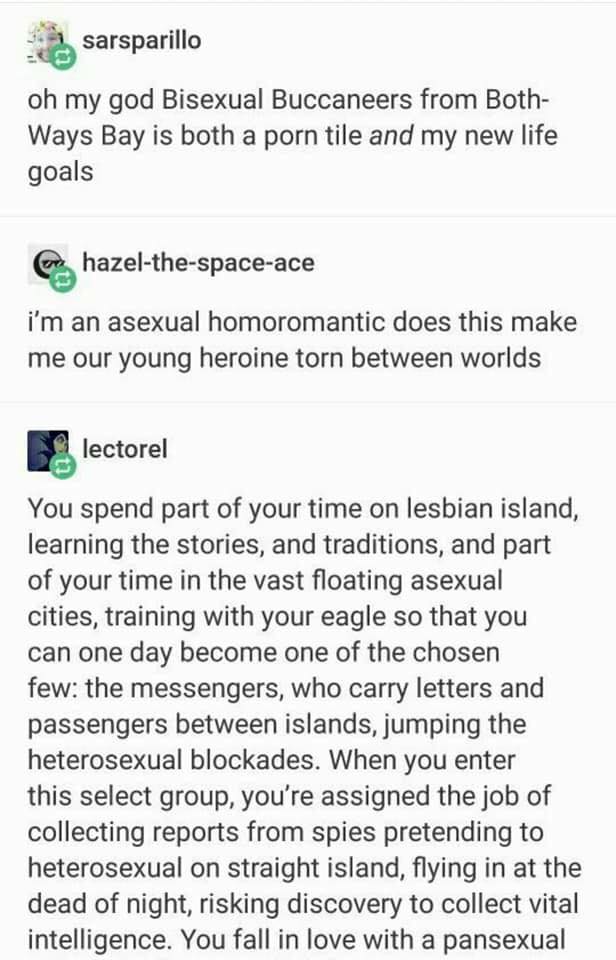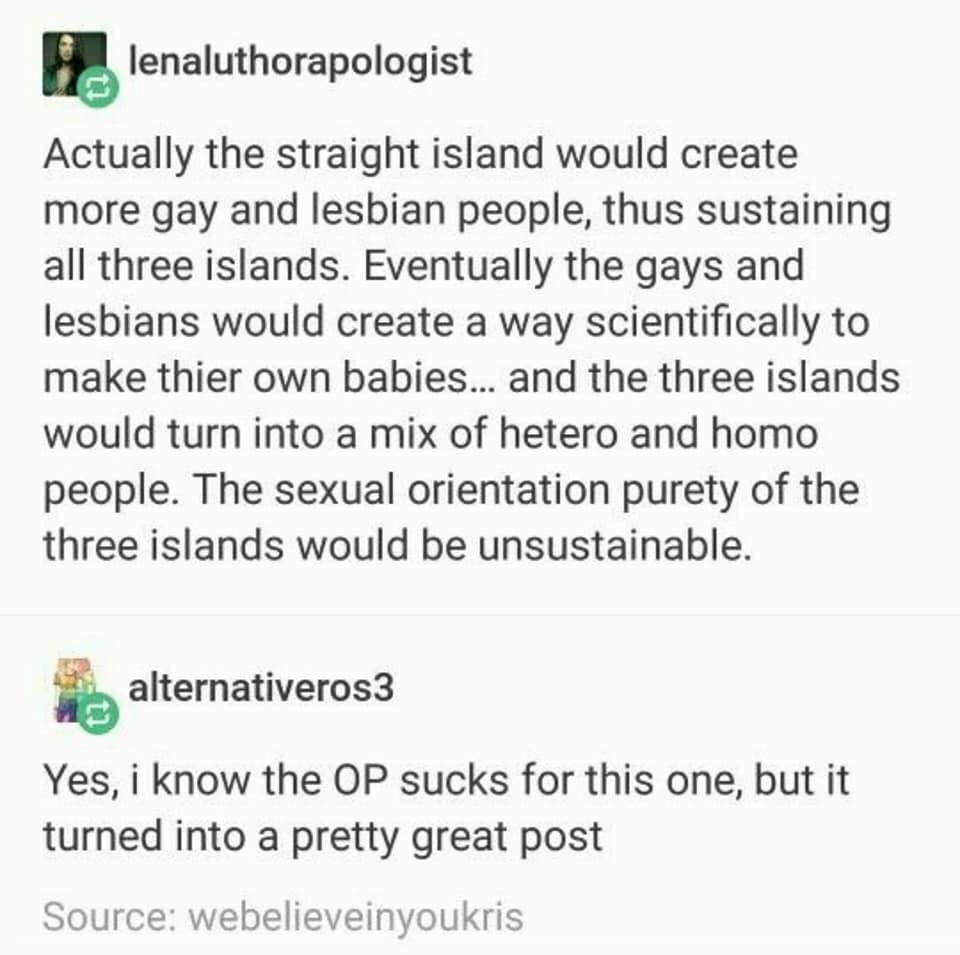-
 Taneras
18Excluding one tenth of a percentage is not arbitrary, then? — Echarmion
Taneras
18Excluding one tenth of a percentage is not arbitrary, then? — Echarmion
Nope.
It's not just the transgender movement though. As was pointed out in the OP, the idea is also supported by parts of the feminist movement. — Echarmion
Be that as it may, the transgender activists, whatever labels they place on themselves, at least based off what I've read, push for transgender rights. They do not push for the idea that a lot of cisgendered people out there are actually transgendered, which is what you need to escape the idea that the vast majority of people's gender identity matches their biological sex. That's the base of my argument, there's certainly a biological aspect to gender roles, that's why you see a 99.9% overlap between the two. You're not going to get that sort of overlap with just socialization.
Things are never "true by definition", unless you think definitions can be true or false. If your argument is "true by definition", it just means your constructed your definition in a way to preclude the conclusion - i.e. your argument is circular. — Echarmion
Without getting too far off into the weeds, the "by definition" was describing the true dichotomy created by the terms transgender and cisgender. You're one or the other. If you're not one, by definition you're the other. If you're not married by definition your single and vice versa. The fact that so many more people, "so many more people" being over 1000:1, admit that their gender identity matches their biological sex should tell you all you need to know about how society views sex, gender, and gender roles.
The behaviors that are acceptable expressions of masculinity / feminity have changed a lot over the past, say, 50 years. If you want to look at sports, look at the changed status of female leagues in many traditionally masculine sports. Association football in Europe is one example. 20 years ago, noone cared about the female teams, now at least the international tournaments garner significant media attention.
The position of women in politics has also changed dramatically. So has the status of "stay at home dads" and in general the role model for fatherhood. — Echarmion
As there are outliers with toe counts, whether or not people's gender matches their biological sex, there are outliers with typically male and female traits. Given a large enough population you'll find enough extremely competitive women who have whatever traits are needed to accel at soccer (not too familiar with the sport, especially at a professional level) to create enough teams for competition. But the existence of such a league isn't a reflection on the female population as a whole, that's not evidence of some sort of social shift where women are becoming more and more competitive, or whatever other trait that's traditionally not associated with females.
I understand there are bell curves, and at the extremes you'll see more masculine women and more feminine men. I don't think claiming that gender roles are largely biologically based necessitates ignoring those extremes. -
 Terrapin Station
13.8k
Terrapin Station
13.8k
I hadn't read every post. Why were we bringing up the biological correlation to gender concepts anyway? -
 TheWillowOfDarkness
2.1kSo, in your view, does nature precede culture? If not, then how do you prevent your theory from falling into an infinite regress? — Harry Hindu
TheWillowOfDarkness
2.1kSo, in your view, does nature precede culture? If not, then how do you prevent your theory from falling into an infinite regress? — Harry Hindu
Nature does not precede culture. Environment and culture are part of nature. Any time a body causes anything, it interacts with its environment. There is no biological cause without an environment. There is no impact of the environment without the affected person's biology. The Nature vs Nurture dichotomy is a myth.
Let's say a person has gene which causes them to have a trait. The genetic effect cannot occur without the environment a person interacts with. They present with this genetic event only if the environment allows. If they were in a different environment, one which would alter the gene/what the gene produces, a different trait would have been caused. Genes cannot have their effect without an impact of environment. No genetic event occurs without its suitable environment.
Similarly, an environmental or cultural impact on someone's behaviour or traits cannot occur without their genetics and wider biological. A human, for example, can only be influenced to learn a language or cultural practice because their body/biology responds in a particular way. If human biology was different, if we didn't generate these sorts of experiences in response to social environment, we wouldn't be subject to a cultural influence. If my body didn't respond to hearing people speak by learning language, no-one would be able to teach me their language. To be socially influenced, I need my particular body, my biology.
There is no infinite regress because biology and environment were never isolated. SOmeone who exists is, at all times, a product of both biological and environment states. There are no causal events which are the body or environment isolated. Every single state of a person is a product of biology and environment. There is never one without the other.
Wrong. I said that biology is impossible if not for the differences and similarities. If there aren't just two sexes, then why don't humans have a wide range of features? Why don't some of have trunks for noses, tails, or some other organs that we might or might not refer to as sexual, or gender? Here's the quote:
If you did a principal components analysis using the combination of all five traits, you’d find two widely separated clusters with very few people in between. Those clusters are biological realities, just as horses and donkeys are biological realities, even though they can produce hybrids (sterile mules) that fall morphologically in between.
Why are these five traits occurring together in such large numbers as to create these clusters of biological realities? — Harry Hindu
I know that... but you equate those differences similarities with the social category of sex. Unless those differences are categorised as "male" and "female," you claim these traits are impossible.
But these traits are not a classification of male or female. They are the existence of bodies. When these bodies exist, they will be so regardless of how they might get categorised. These bodies could be in any sex category, or not in a sex category at all, and they wouldn't be any different.
In any case, the existence of the given body is why a particular body with traits exists. The mule is not a sterile body because of how it's parents were categorised in terms of sex. It is so because the two bodies in reproduction produced this body of a mule which is sterile.
If differences between bodies are real, then how is it that doesn't determine "fate"? — Harry Hindu
If you mean "fate" in the sense of many different ways a biological entity comes to exist, it absolutely does (in conjunction with its environment, of course). The real differences of body just aren't sex classification. Bodies will be doing their thing regardless of whether they are categorised as male, female, sexless or anything else.
A penis is penis, whether of a male person, female person, intersex person a sexless person.
Our similarities or difference in form explains the differences in behavior. Can you lift a large fallen tree with your nose? An elephant can.
If social constructionism isn't a cause, but a state, then what is it that you propose to change (the cause) that leads to a new effect (gender-neutrality)? Also, how is it that you have come to realize any of this on your own if your ideas are simply the result of cultural constructionism and the culture you grew up in constructed a binary concept of sex and gender? — Harry Hindu
They do not. The elephant can life a tree with its nose (unlike me), but not because of form. It can do so because it has a body/nose strong enough to lift the tree. The elephant can lift this tree because it is a state(s) with a nose strong enough to do so. Explanation is in the presence of the body not the form. Change the existence of body in question, say a elephant with a weak nose or a human with a strong one, and the opposite behaviour will be true. Existence accounts for our behaviours, not ideas.
A change is achieved by developing a certain understanding of gender and it relationship to our behaviour, identifies and bodies. It's a question of engaging biological and environmental influences to produce a new gender-neutral culture. Like any culture change or new understanding, one teaches it with a variety different biological and environmental influences.
States of "social construction" are caused by a variety of biological and environmental influences. The fact social construction is a state doesn't mean it isn't a product of other things (e.g. biology, environment, cultural states, etc.), it just means to be a "a social construct" is to be one type of state rather than a cause.
My ideas are a result of my biology interacting with the environment I've lived in over my life. There is no separation between "realised this on my own" and "a result of the culture I grew up in." All my ideas, even my entirely original ones (if their are any), are a result of the culture I grew up in. My culture was the environment which interacted with my body to produce my ideas. Culture does not have to representationally insert an idea (e.g.someone teaching me what a word means) into my head to be a cause. My culture just needs to be an environment " that didn't cause my body to have a different idea" to are an influence in forming my ideas.
A lot of ideas are also formed in relation to those in my culture. This very discussion and my augments about sex and gender, for example, are a product of the binary concept of of sex and gender in my culture. Trans people, gender neutrality as opposed to a binary, etc., are all concepts formed out of the gender binary. If I lived in culture without a gender binary (and didn't I imagine it), my argument would be totally different and I probably wouldn't even understand most, if anything, people were talking about in this thread. -
 Joshs
6.7kThe biological component of gender produces not only differences on body shape, physiology and genitalia dictated by chromosomes, but also differences in brain physiology , likely mediated by hormones in the womb. This hormonal effect on 'brain wiring' produces differences along a spectrum of masculinity-femininity. Unlike the binary bodily effects of sex chromosomes, which allow for the most part a neat division of male vs female in the population , gender-based brain wiring produces a much more varied distribution of behavioral gender traits among populations. Apart from the LGBT spectrum , there is a wide, although less noticeable, spectrum within the so-called heterosexual population in terms of masculinity-femininity .
Joshs
6.7kThe biological component of gender produces not only differences on body shape, physiology and genitalia dictated by chromosomes, but also differences in brain physiology , likely mediated by hormones in the womb. This hormonal effect on 'brain wiring' produces differences along a spectrum of masculinity-femininity. Unlike the binary bodily effects of sex chromosomes, which allow for the most part a neat division of male vs female in the population , gender-based brain wiring produces a much more varied distribution of behavioral gender traits among populations. Apart from the LGBT spectrum , there is a wide, although less noticeable, spectrum within the so-called heterosexual population in terms of masculinity-femininity .
But because of the inseparable interplay of biology ans culture, what constitutes masculinity and femininity slowly changes over time in terms of social roles.
I think there will always be a way to point to a masculine-feminine spectrum in society, but it would be foolish to try to nail down for all time how to define its attributes.
I think the most crucial concept in these nature-nurture gender discussions, and the hardest for traditionalists to grasp, is the somewhat threatening idea that biology can shape brain function in such a way as to produce in each of us a particular gender-based style of perceptual engagement with the world. And furthermore, that there is no such thing as a biological body outside of behavior. Behavior is embodied and the body , designed as it is to behave, to move , to interact in a world, can only fully be understood in the way that it is animated. If the body cannot be properly understood as a slab of meat disconnected from behavior, then it is meaningless to point to a strict two category definition of the biological body in terms of male vs female chromosomes. Behavior dictates the gender of the body in terms of how we move it, how we walk and talk, etc. that means that two heterosexual males are differently gendered, bodily as well as psychologically by subtle differences between them in masculinity-femininity. -
 Judaka
1.7k
Judaka
1.7k
I am referring to different stages of an individuals life, I'd say, if you were assigned a gender at birth you're powerless to argue against that until you're at least eleven.
It is not my argument, I think gender being socially constructed is a ludicrous notion. I don't think you are representing your opposition as well as you could but I don't feel like arguing further about this.
Good luck arguing against those who think gender is socially constructed, I've given up on them. -
 Harry Hindu
5.9k
Harry Hindu
5.9k
First, thanks for your participation in the thread.I am referring to different stages of an individuals life, I'd say, if you were assigned a gender at birth you're powerless to argue against that until you're at least eleven.
It is not my argument, I think gender being socially constructed is a ludicrous notion. I don't think you are representing your opposition as well as you could but I don't feel like arguing further about this.
Good luck arguing against those who think gender is socially constructed, I've given up on them. — Judaka
Second, it was never my intent to try to change those that have a political agenda to push because they're irrational and that would simply be a fool's errand. They aren't interested in logical truth. Political agendas often ignore the bad science they are based on. I'm more interested in reaching reasonable people who enjoy skepticism and are willing to question the status quo and and be open-minded. I'm a scientist at heart and abhor politics and politicians who almost always lie or warp the truth for their own ends. -
 Harry Hindu
5.9k
Harry Hindu
5.9k
This seems like a contradiction. Nature does precede culture as nature is the amalgam of all states/environments.Nature does not precede culture. Environment and culture are part of nature. — TheWillowOfDarkness
Nature is reality - what is real. Like you said, the biological differences and similarities are real, meaning that they are natural, and a product of natural selection.
Culture is a kind of environment. An environment is a part of nature. An environment applies pressure on genetic fitness. Culture - as an environment - can apply environmental pressure on our genetic (evolutionary biology) and psychological/behavioral (evolutionary psychology) characteristics.
Organisms, as part of the environment, act as part of natural selection by becoming selective pressures themselves on other species. Predators and prey create selective pressures on each other, in a special relationship that evolves each species in special ways. Culture can be thought of as the selective pressure from the ideas and behaviors of a particular group of organisms on the physical and psychological aspects of individual organisms (I'm using "organisms", not just "humans", because aliens could have culture too).
Yes! This is what I've suggested before in this thread and in others. The science article in the OP mentions this idea as well. Could it be that we are beginning to see eye to eye - that gender isn't just a social construction?Any time a body causes anything, it interacts with its environment. There is no biological cause without an environment. There is no impact of the environment without the affected person's biology. The Nature vs Nurture dichotomy is a myth. — TheWillowOfDarkness
There are genes that are influenced by the environment - sure. This is a natural process and is has a scientific name for it - epigenetics. Another field of science that I mentioned - evolutionary psychology - posits the idea that our minds are affected by natural selection as well.Let's say a person has gene which causes them to have a trait. The genetic effect cannot occur without the environment a person interacts with. They present with this genetic event only if the environment allows. If they were in a different environment, one which would alter the gene/what the gene produces, a different trait would have been caused. Genes cannot have their effect without an impact of environment. No genetic event occurs without its suitable environment. — TheWillowOfDarkness
Agreed. Like I said, you can't lift a fallen tree with your nose and you also can't teach an elephant English.Similarly, an environmental or cultural impact on someone's behaviour or traits cannot occur without their genetics and wider biological. A human, for example, can only be influenced to learn a language or cultural practice because their body/biology responds in a particular way. If human biology was different, if we didn't generate these sorts of experiences in response to social environment, we wouldn't be subject to a cultural influence. If my body didn't respond to hearing people speak by learning language, no-one would be able to teach me their language. To be socially influenced, I need my particular body, my biology. — TheWillowOfDarkness
There's no infinite regress now that you've admitted that everything isn't socially constructed, not because biology and environment were never isolated - which is just wrong. Biology is a recent state of affairs in the universe - an exponential increase in complexity in this corner of the universe - one that came about thanks to the sustainable energy the sun has provided over the past 4.5 billion years. Environments have always existed since the Big Bang. Biology has not. In other words, nature precedes all, as everything is part of nature.There is no infinite regress because biology and environment were never isolated. SOmeone who exists is, at all times, a product of both biological and environment states. There are no causal events which are the body or environment isolated. Every single state of a person is a product of biology and environment. There is never one without the other. — TheWillowOfDarkness
So, it seems to me that we agree mostly, and maybe are just disagreeing on terms at this point? -
 Christoffer
2.5kSo "gender" is a cultural characteristic - something that is part of the identity of a culture, not an individual, and "gender identity" is one's perception of one's self relative to this cultural characteristic of a particular culture? So, in essence one isn't changing one's "gender" when moving to a culture with a different "gender". They are changing their "gender identity". — Harry Hindu
Christoffer
2.5kSo "gender" is a cultural characteristic - something that is part of the identity of a culture, not an individual, and "gender identity" is one's perception of one's self relative to this cultural characteristic of a particular culture? So, in essence one isn't changing one's "gender" when moving to a culture with a different "gender". They are changing their "gender identity". — Harry Hindu
Yes, biological gender doesn't change, but their perception of their gender identity may change. However, it's more likely that the culture they grew up in become their definition of gender. If someone grows up in a place which has a strict idea about what it means to be a woman, they will view those ideas and characteristics about "woman" as the norm of what it means to be a woman. Even if they move to a new place, they will not be able to easily erase their "programming" and they will view women in the same way. Which is why people who moves to another country with a vastly different culture, will have a hard time mixing well into that culture, it might take years or never at all.
So when someone says that they feel like a woman, they are referring to their gender identity, not their gender. Gender is a social construction and gender identity is not. Gender identity is a personal view. Is this all correct? — Harry Hindu
The perception of gender is the social construct and that social construct informs how we view our gender identity. If a culture has an idea of how a man should be and you are a woman who feels like your identity fits more with the construct of a man in that culture, you might become confused as to why you biologically are a woman, but every aspect of your feelings and psyche points to the idea of a man. When you then come into contact with other people in that culture, they treat you like a woman because that's your biological gender, but you feel awkward like you don't belong in that category, that all the ideals of being a woman don't apply to you.
In that case, you might start thinking about things like a sex change and acting out like a man instead of a woman, because that is what you feel is right for you in that culture. The social construct of how genders should act and behave put your identity into a category that was in conflict with your real biological gender, so you either try to deny your gender identity or you go ahead and accept your own identity where you feel at home.
I think this is like anything really. We have something physical in front of us, but we experience it by perception. Our bodies apply to this as well, we have a perception of it and it has a physical existence. Perception and physical existence don't always play hand in hand. -
 Joshs
6.7k"The perception of gender is the social construct."
Joshs
6.7k"The perception of gender is the social construct."
Perception of gender in terms of how we move our bodies, how we process perceptual information, how we perceive others in terms of sexual attraction, is not simple socially constructed. If I were to take you in a time machine back to when you were still in the womb and flood your brain with certain sex hormones , your brain physiology would be altered in terms of gendered perceptual-affective processing(such studies have been done on lab animals). I could steer you in more of a masculine or feminine direction. I'm not saying that the definition of masculinity and femininity is fixed, though. It changes throughout human history as a consequence of the interaction between biology and culture, but there is an underlying brain physiology basis that is independent of culture. -
 Possibility
2.8kOk - I get that there is certain amount of brain and body physiology that is determined at birth - some of which is influenced by interaction with the environment in the womb (eg. sex hormones at particular times, etc).
Possibility
2.8kOk - I get that there is certain amount of brain and body physiology that is determined at birth - some of which is influenced by interaction with the environment in the womb (eg. sex hormones at particular times, etc).
I also get that some of our unique gifts, interests and talents are determined partly by biology and partly by interaction with environment, culture, significant others (including family, teachers, etc.).
But is it really helpful anymore to categorise any of them along gender lines?
Ideally, a child’s genitalia (and therefore their gender) would not factor into identity until puberty, although they would hopefully have had opportunity by then to explore a range of social roles and to ‘dress-up’. At this point their physical strength, body shape and brain function might begin to limit some of their career/hobby/sporting options, and they will start to have some idea of their sexual attraction preferences.
I guess from this point it would be helpful to describe attraction along the lines of masculine/feminine physical attributes, preferred sexual behaviour or activities (including procreation), etc that would allow one to find an ideal sexual partner, either casually or romantically. But I’m trying to rack my brains to determine what else ‘gender’ is useful for anymore...
I understand that life would not be quite so simple if we couldn’t operate in a male-female binary, especially in terms of language and pronouns - but surely we’ve worked out by now that real life is not as binary (or as simple) as we once imagined it was.
I’m also conscious of the 0.1% of people that we so easily dismiss as an anomaly because they don’t fit into our neat categories. In a population of 6 billion people, that’s still 6 million human beings who right now don’t fit into our categories of what a human being can be - not to mention subsequent generations. We may not ever meet them personally - but, I’m sorry, I tend to find that level of dismissiveness unacceptable. -
 Christoffer
2.5kPerception of gender in terms of how we move our bodies, how we process perceptual information, how we perceive others in terms of sexual attraction, is not simple socially constructed. — Joshs
Christoffer
2.5kPerception of gender in terms of how we move our bodies, how we process perceptual information, how we perceive others in terms of sexual attraction, is not simple socially constructed. — Joshs
This is straw-manned. Of course not everything around sexuality is a social construct, but how you act on the biological impulses and emotions you have and what is creating those feelings externally is very much a construct. Everything around you, how you navigate the world is based on what you've learned and experienced so far.
If I were to take you in a time machine back to when you were still in the womb and flood your brain with certain sex hormones , your brain physiology would be altered in terms of gendered perceptual-affective processing(such studies have been done on lab animals). — Joshs
Yes, but you are missing the entire point. Did you read the previous posts with the of back and forth arguments? If you did that, it's exactly what I'm talking about. If you have emotions and biological drives that don't comply with the norms of society and that's why you lean towards another gender concept, you try to fit in within that social construct as there are no concepts in our social construction of a person that is balancing in between. People want to fit everyone else into boxes with labels, this is how we process the world around us. If someone doesn't fit in either box with labels "man" and "woman", people will behave like they're from outer space. Read my earlier posts.
I could steer you in more of a masculine or feminine direction. I'm not saying that the definition of masculinity and femininity is fixed, though. It changes throughout human history as a consequence of the interaction between biology and culture, but there is an underlying brain physiology basis that is independent of culture. — Joshs
It changes throughout human history as a consequence of the interaction between biology and culture
You counter-argued your own argument here since it's exactly what social construct is. The culture is the construct and the clash between biology and culture creates our gender identities. I don't know why it's difficult to juggle the two concepts at the same time? Gender identity is a construct as it relates to the perception of the biological gender, which is our biology.
The clash between the perception of our biology and our biological drives is the basic things we have tried to control ever since society was created in human history. And that is culture, which is a construct, we have constructed ideas about men and women, different in different cultures. Put any child with any type of hormonal makeup into a culture and they will grow up within the confines of that construct. It will affect how they act, process the world and process their own emotions. If you remove the construct and have two people: a man and a woman just existing together without any previous culture, they will spot the biological differences they have between them and then start constructing behavior around it. If you have three people as a starting point, one who in our culture would be unsure which gender they belong to, they wouldn't ask those questions in a tabula rasa culture, since there are no constructs to measure against. There would just be three people without any demand to put them in two boxes, they essentially exist in three boxes without labels. As that culture grows, it may be that such a culture then has three labeled boxes for their basic understanding of gender.
Everything around you is a social construct. From the time you wake up to when you go to bed, you navigate through societies construct. Built up through thousands of generations each changing small things about how we should handle our biological drives and impulses.
Think about this every time you have an impulse or a thought of doing something and you don't, why didn't you? Do you think that's biology? No that's how we've reasoned around our biology, that's the construct that programmed you not to act on that impulse; "oh, if I did that, people would think I'm crazy" or "I can't do that, it's stealing" ...or "I can't do that, it's not what a man should do". That is a construct. -
 Joshs
6.7kI notice that when you talk about the contribution of biology to gendered behavior you emphasize drives and impulses. What kinds of drives and impulses can be controlled so as to fit into the accepted cultural norms? Well, obviously, who one goes to bed with can be controlled. And the clothes one choose to wear. Or maybe not as much as we think. The question is what are the limits to control of gender expression, and if there are limits, why?
Joshs
6.7kI notice that when you talk about the contribution of biology to gendered behavior you emphasize drives and impulses. What kinds of drives and impulses can be controlled so as to fit into the accepted cultural norms? Well, obviously, who one goes to bed with can be controlled. And the clothes one choose to wear. Or maybe not as much as we think. The question is what are the limits to control of gender expression, and if there are limits, why?
You'll notice that I focused on the underlying perceptual processing level of gendered psychology. If we fully appreciate how globally and primordially psychological masculine-feminine 'brain physiology' shapes our experience of the world, maybe you can agree that for those on the far ends of the 'brain physiology' gender spectrum, the effects of brain function on gendered behavior work at a level well below the ability of someone to mask these effects, or in many cases to be even aware of them. Thus, the situation where everyone else knows someone is gay before they do, even if they don't pursue anyone sexually.
It may be a stereotype, but it is still useful to look at the list of feminized attributes that are associated with gay men on the far end of the spectrum. Limp wrist, feminine walk, lisp and often higher voice, interest in what are generally considered girly activities like playing with dolls,throws like a girl, choose fashion and color and hairstyle that are considered feminine, even when they aren't aware of it.
The point is that there are so many tendencies to perceive and to act that can be associated with the far end of the gay male (and lesbian) spectrum due to brain wiring that it is impossible to control , or even be aware of all of these, and many families will point out that such behaviors became noticeable from a very early age. That's why there has always been a category throughout cultural history, in diverse societies, for highly feminized males, those who cannot disguise their perceptual gender. The only effect of culture on these individuals is an indirect one. They have has to be careful of whom they were seen having sex with in order to avoid punishment, but otherwise made their way through society as an 'other', despite their most desperate attempts to fit in.
Most of the discussion around controlling and choosing psychological gender pertain to those near the middle of the spectrum whose brain wired gender doesn't make them stand out in relation to the binary category their chromosomes put them in. these individuals have always been able to 'pass' as normal relative to whatever social conventions dominated if they so chose.
Transgender as a category is multifaceted, overlapping but not mirroring issues pertaining to brain wiring. Some feminized biological males may feel they were born in the wrong body, and others may not. and some males toward the middle of the brain wiring spectrum may want to to change their physical gender identity. This can sometimes result in a situation of a female-appearing , masculine-acting transgender identity(Caitlyn Jenner?).
Welcome to The Philosophy Forum!
Get involved in philosophical discussions about knowledge, truth, language, consciousness, science, politics, religion, logic and mathematics, art, history, and lots more. No ads, no clutter, and very little agreement — just fascinating conversations.
Categories
- Guest category
- Phil. Writing Challenge - June 2025
- The Lounge
- General Philosophy
- Metaphysics & Epistemology
- Philosophy of Mind
- Ethics
- Political Philosophy
- Philosophy of Art
- Logic & Philosophy of Mathematics
- Philosophy of Religion
- Philosophy of Science
- Philosophy of Language
- Interesting Stuff
- Politics and Current Affairs
- Humanities and Social Sciences
- Science and Technology
- Non-English Discussion
- German Discussion
- Spanish Discussion
- Learning Centre
- Resources
- Books and Papers
- Reading groups
- Questions
- Guest Speakers
- David Pearce
- Massimo Pigliucci
- Debates
- Debate Proposals
- Debate Discussion
- Feedback
- Article submissions
- About TPF
- Help
More Discussions
- Gender is a social construct, transgender is a social construct, biology is not
- Request for Explanation as to Why my Discussion regarding Race as a Social Construct was Deleted.
- The Implication of Social Contract on Social Relations
- The Power of Mass Disinformation Through Social Media To Divide & Conquer Democratic Nations?
- Other sites we like
- Social media
- Terms of Service
- Sign In
- Created with PlushForums
- © 2026 The Philosophy Forum






